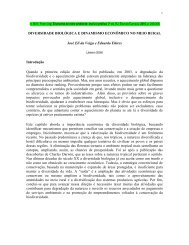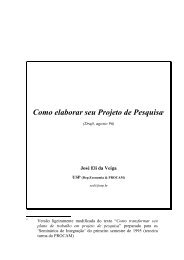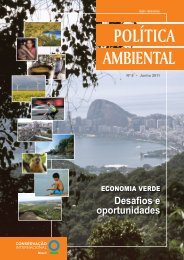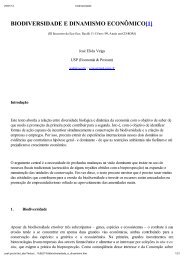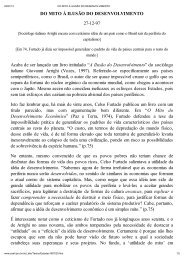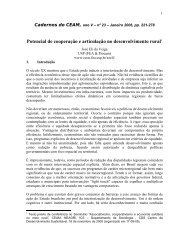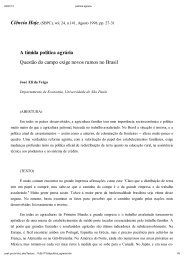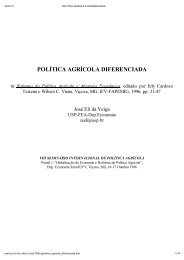sustainable development 20 years on from the ... - José Eli da Veiga
sustainable development 20 years on from the ... - José Eli da Veiga
sustainable development 20 years on from the ... - José Eli da Veiga
You also want an ePaper? Increase the reach of your titles
YUMPU automatically turns print PDFs into web optimized ePapers that Google loves.
11<br />
FOREWORD<br />
In December <str<strong>on</strong>g>20</str<strong>on</strong>g>09 <strong>the</strong> General Assembly adopted resoluti<strong>on</strong> 64/236 and agreed to c<strong>on</strong>vene <strong>the</strong> United<br />
Nati<strong>on</strong>s C<strong>on</strong>ference <strong>on</strong> Sustainable Development in Brazil in June <str<strong>on</strong>g>20</str<strong>on</strong>g>12. This C<strong>on</strong>ference, which will be<br />
held in Rio de Janeiro <str<strong>on</strong>g>20</str<strong>on</strong>g> <str<strong>on</strong>g>years</str<strong>on</strong>g> after <strong>the</strong> United Nati<strong>on</strong>s C<strong>on</strong>ference <strong>on</strong> Envir<strong>on</strong>ment and Development, or<br />
<strong>the</strong> Earth Summit, represents a historic opportunity to take stock of <str<strong>on</strong>g>development</str<strong>on</strong>g>s over <strong>the</strong> past two<br />
decades, assess <strong>the</strong> progress made and <strong>the</strong> difficulties encountered and explore new forms of cooperati<strong>on</strong><br />
capable of expediting <strong>the</strong> transiti<strong>on</strong> towards <str<strong>on</strong>g>sustainable</str<strong>on</strong>g> <str<strong>on</strong>g>development</str<strong>on</strong>g>. The Member States have also<br />
agreed to analyse two main <strong>the</strong>mes at <strong>the</strong> C<strong>on</strong>ference: (a) a green ec<strong>on</strong>omy in <strong>the</strong> c<strong>on</strong>text of <str<strong>on</strong>g>sustainable</str<strong>on</strong>g><br />
<str<strong>on</strong>g>development</str<strong>on</strong>g> and poverty eradicati<strong>on</strong>, and (b) <strong>the</strong> instituti<strong>on</strong>al framework for <str<strong>on</strong>g>sustainable</str<strong>on</strong>g> <str<strong>on</strong>g>development</str<strong>on</strong>g>.<br />
The present document is divided into two parts: an analysis of progress made and difficulties<br />
encountered in Latin America and <strong>the</strong> Caribbean in implementing global commitments <strong>on</strong> <str<strong>on</strong>g>sustainable</str<strong>on</strong>g><br />
<str<strong>on</strong>g>development</str<strong>on</strong>g> since 1992, and proposed guidelines for moving towards <str<strong>on</strong>g>sustainable</str<strong>on</strong>g> <str<strong>on</strong>g>development</str<strong>on</strong>g> in <strong>the</strong> regi<strong>on</strong>.<br />
One of <strong>the</strong> milest<strong>on</strong>e achievements of <strong>the</strong> Earth Summit in 1992 was <strong>the</strong> internati<strong>on</strong>al<br />
community’s acceptance of <strong>the</strong> c<strong>on</strong>cept of <str<strong>on</strong>g>sustainable</str<strong>on</strong>g> <str<strong>on</strong>g>development</str<strong>on</strong>g>, which was broadly disseminated in<br />
<strong>the</strong> Rio Declarati<strong>on</strong> <strong>on</strong> Envir<strong>on</strong>ment and Development. Yet, twenty <str<strong>on</strong>g>years</str<strong>on</strong>g> later —and despite significant<br />
advances— <strong>the</strong> <str<strong>on</strong>g>development</str<strong>on</strong>g> model is still unable to bring about simultaneous and synergic progress <strong>on</strong><br />
<strong>the</strong> social, ec<strong>on</strong>omic and envir<strong>on</strong>mental fr<strong>on</strong>ts.<br />
The world now faces an imperative for change: to move towards a new model of <str<strong>on</strong>g>development</str<strong>on</strong>g><br />
with <strong>the</strong> value of equality at <strong>the</strong> core of its acti<strong>on</strong>s, <strong>on</strong>e which is capable of carrying forward simultaneous<br />
social <str<strong>on</strong>g>development</str<strong>on</strong>g>, ec<strong>on</strong>omic growth and envir<strong>on</strong>mental sustainability. Development cannot c<strong>on</strong>tinue to<br />
perpetuate poverty and inequality and to deplete natural resources and ecosystems. Undeniable evidence<br />
now exists that protecting ecosystems and ecosystem services improves health, physical integrity, food<br />
security and o<strong>the</strong>r basic aspects of human security and of individual and community well-being.<br />
A recurrent, cross-cutting problem is resistance to fully c<strong>on</strong>sidering all <strong>the</strong> costs of ec<strong>on</strong>omic<br />
activity in investment policies, stan<strong>da</strong>rds and decisi<strong>on</strong>s —or, indeed, <strong>the</strong> inability to do so. Hence <strong>the</strong><br />
multiple negative envir<strong>on</strong>mental and health externalities which lie at <strong>the</strong> root of almost <strong>the</strong> entire array of<br />
envir<strong>on</strong>mental issues. And, by exacerbating <strong>the</strong>se externalities, <strong>the</strong> high discount rates employed in<br />
investments lay a disproporti<strong>on</strong>ate share of <strong>the</strong> costs of ec<strong>on</strong>omic activity <strong>on</strong> <strong>the</strong> present generati<strong>on</strong>’s<br />
most disadvantaged members and <strong>on</strong> future generati<strong>on</strong>s.<br />
The proposal by <strong>the</strong> United Nati<strong>on</strong>s to reflect up<strong>on</strong> a “green ec<strong>on</strong>omy in <strong>the</strong> c<strong>on</strong>text of<br />
<str<strong>on</strong>g>sustainable</str<strong>on</strong>g> <str<strong>on</strong>g>development</str<strong>on</strong>g> and poverty eradicati<strong>on</strong>” aspires to catalyse <strong>the</strong> changes needed in <strong>the</strong> regi<strong>on</strong>.<br />
Under <strong>the</strong> principle of shared but differentiated resp<strong>on</strong>sibilities, <strong>the</strong> green ec<strong>on</strong>omy is understood in<br />
oppositi<strong>on</strong> to a brown ec<strong>on</strong>omy, which compartmentalizes, pollutes, excludes and destroys. A green<br />
ec<strong>on</strong>omy is <strong>on</strong>e which augments and affords priority to human well-being and social equity, while<br />
significantly reducing envir<strong>on</strong>mental risks and ecological scarcities.<br />
This proposal advocates <strong>the</strong> redesign of specific public policies that promote a low-carb<strong>on</strong><br />
<str<strong>on</strong>g>development</str<strong>on</strong>g> pattern resistant to disasters and climate change, create green jobs and factor into decisi<strong>on</strong>making<br />
<strong>the</strong> ec<strong>on</strong>omic costs and benefits associated with <strong>the</strong> use of ecosystem services and materials. An<br />
ec<strong>on</strong>omy for <str<strong>on</strong>g>sustainable</str<strong>on</strong>g> <str<strong>on</strong>g>development</str<strong>on</strong>g> reduces negative envir<strong>on</strong>mental impacts, such as carb<strong>on</strong> emissi<strong>on</strong>s<br />
and polluti<strong>on</strong>, promotes efficient use of energy and resources and avoids <strong>the</strong> loss of biological diversity<br />
and ecosystem services, thus improving well-being now and in <strong>the</strong> future.



